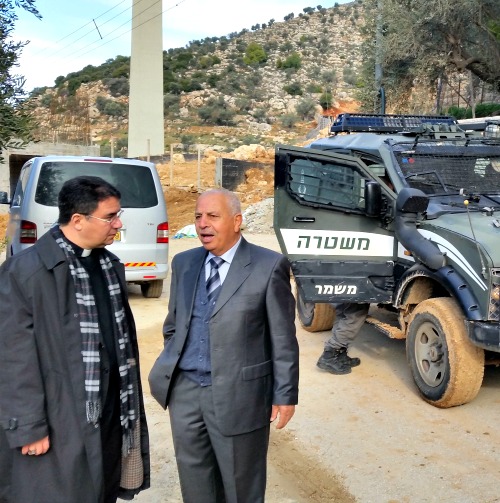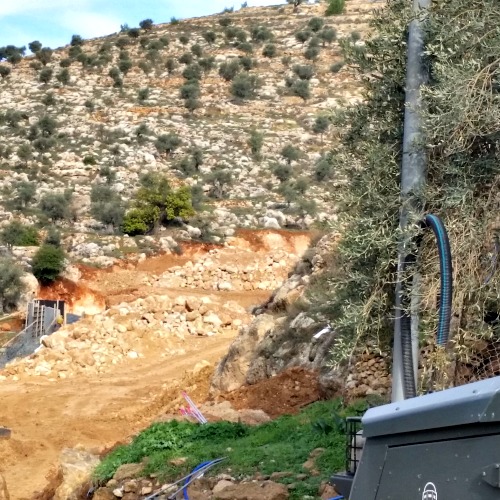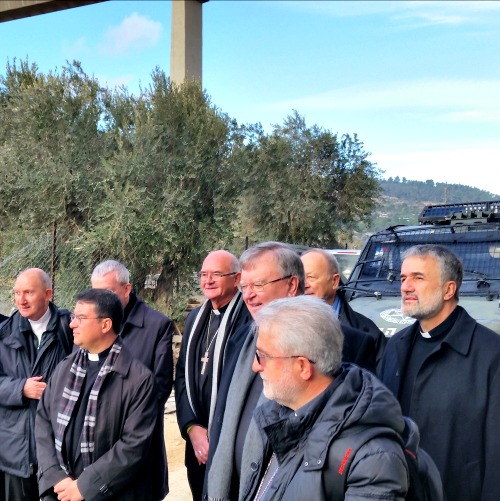Christians in Palestine: Life Defined by Borders, Walls and Expropriation
NEWS ANALYSIS: As the Church prays for ‘occupiers and our oppressors,’ does the U.S. have the key?

Good news for Christians in the Holy Land generally comes with a subtext of anguish.
The only Catholic parish in the Gaza Strip — a 26-mile-long slice of territory on the Mediterranean squeezed between Israel and Egypt — managed to get permits for 857 Christians to travel to Bethlehem and Jerusalem.
That’s about 66% of Gaza’s entire Christian population of 1,300, which includes some 130 Catholics.
Product of a tumultuous recent past, Gaza has been blockaded by Israel since 2007. Many of the people who received the unexpected 45-day travel permits, especially men under age 35, have not been allowed to leave the Palestinian territory, twice the size of Washington, D.C., in eight years. Israel fears they could be terrorists.
Just two border crossings link Gaza with the rest of the world: In the north, the Israeli military controls access, and in the south, Egypt has it locked.
“We praise the Lord for this grace,” said Father Mario de Silva, a priest at Gaza’s Holy Family Church, who helped prepare permit applications. It was the first year Catholics managed the process on behalf of the Catholic and Orthodox communities. Most Palestinian Christians in Gaza are Orthodox.
Devastating War
Two years ago, during the 50-day war between Israel and Gaza, Holy Family Church was in the news because it was damaged under air attack. Nearly half the population had homes damaged or destroyed by relentless bombing.
War-related destruction still cripples life in Gaza, mainly because basic construction materials, including concrete and cement, aren’t locally available and are restricted by Israel and Egypt, which say radicals might use them.
Gaza has the highest unemployment rate in the world — about 43% for adults and 60% for youth. The population is very young: 43% of Gaza residents are under age 15. A recent United Nations report describes the dense area’s future as “unlivable” by 2020 based on the lack of water, housing and jobs. Even leading Israeli publications include articles on the unacceptable living conditions in Gaza.
Unable to see a future, many try to leave the Gaza Strip for good, despite loving their homeland.
A delegation of bishops and staff from around the world, sponsored by the Holy See, visited Gaza in January as part of the annual Holy Land Coordination pilgrimage, started in 1998 to support Christian communities in the region.
The delegation toured transitional wood houses built with Catholic Relief Services’ (CRS) support. Hundreds have been completed in Gaza and the town of Khizaa, but, the delegation learned, the program is imperiled by an Israeli ban on imported wood.
According to press reports, Israel bans wood to prevent militants from using it in tunnel construction, designed to evade border checkpoints.
Archbishop Stephen Brislin of Cape Town, South Africa, described Gaza as a “terrible place and an open-air prison” in a Vatican Radio interview, but he saw more positive activity this year and greater determination to rebuild than he witnessed during last year’s pilgrimage.
Although Bishop Brislin avoids labeling the situation in Gaza as apartheid, he sees similarities between South Africa’s past and Gaza’s present due to “the fact that the Israelis have absolute control over what goes in and what cannot go in. … It’s very much a controlled situation, and I think that is rather reminiscent of South Africa, where the white government, the apartheid government, really controlled black people’s lives, where they could live, where they could go to school, where they could visit family even … but we mustn’t simplify the situation or simply label it.”
The delegation’s final statement also describes Gaza as a jail: “While there are signs of hope and the resilience of the population is remarkable, many remain homeless and traumatized by the war. The blockade continues to make their lives desperate, and they effectively live in a prison.”
Just a few weeks after the bishops’ visit, the Israeli military launched more air strikes on Gaza, reportedly in retaliation for rocket attacks from Gaza — part of “ongoing violence,” in the words of Holy Land Coordination, that marks life in the region. Public opinion polls show the attacks have radicalized Palestinian opinion.
But there’s no unanimity in Israel regarding the benefit’s aggressive strategy: One founder of the country and former president, Shimon Peres, said Israel “was not born to rule over other people.”
Reversal
The Holy Land delegation’s 14 bishops also visited the West Bank, on the Jordan River, 25 miles away. Although the land is not contiguous, the Gaza Strip and West Bank together comprise the state of Palestine, recognized by the Holy See last June.
Some believe Vatican recognition of Palestine has led to more harsh treatment of Christian communities by Israeli officials, especially Christians who live near the Israel-Palestine border.
For example, a year ago, the army planned to build a 25-foot concrete separation barrier in the Cremisan Valley, a rare swath of green, agricultural land south of Jerusalem, where the West Bank’s only winery is run by a Salesian monastery. The proposed wall would divide the monastery from a Salesian convent and school. It would separate the school from its Palestinian students, and it would allow Israel to confiscate productive, ancient land from 58 Palestinian Christian families. A legal battle over the wall went on for years. The Israeli Supreme Court ruled against the government.
Catholic media and the Christian press trumpeted the ruling last April as an important victory.
The Latin Patriarch of Jerusalem, Fouad Twal — effectively, the archbishop for all Latin-rite Catholics in Israel, Palestine, Jordan and Cyprus — was ecstatic, having supported the legal defense of the Salesian Sisters and mounted a global campaign on the fundamental injustice of separating sisters from brothers, students from school and landowners from vineyards.
So it was a shock last summer when the Israeli Supreme Court reversed itself and gave the army a green light to build the intrusive structure. Under the latest scheme, the monastery and convent remain, technically, accessible to each other on the West Bank side of the wall, but private land, including fruit-bearing trees, will be confiscated and taken for the Israeli side.
Land Confiscation
Digging started last August, beginning with the harsh uprooting of ancient trees, just weeks before they were due for harvest. Christians comprise less than 2% of the population in Israel and the West Bank; taking away their land and livelihood is tantamount to evicting them, say local observers.
Auxiliary Bishop William Shomali, vicar of the Latin Patriarch, told Agenzia Fides he suspects the distressing reversal could be “a reaction to the recent official recognition of the state of Palestine by the Holy See.”
Another theory mentioned by the bishop is that the purpose of the wall’s route is to facilitate unification of two illegal Jewish settlements, Gilo and Har Gilo, and provide the settlements with green space, while shielding Jewish settlers from Palestinians.
Other critics of the wall’s disruptive layout consider the settlements, with a combined population of 35,500, to be the ulterior motive for Israeli actions, including a local Palestinian priest, who held weekly Mass on the proposed site for more than two years.
The U.S. Conference of Catholic Bishops wrote several letters to the U.S. government, asking it to intervene with Israel on behalf of the Salesian order and Palestinian families.
As U.S. Bishop Richard Pates of Des Moines, Iowa, chairman of the U.S. bishops’ Committee on International Justice and Peace wrote in 2014 to U.S. Secretary of State John Kerry: “As I stood amidst the beauty of this agricultural valley and heard the testimony of the Christian families whose lands, livelihoods and centuries-old family traditions are threatened, I was simply astounded by the injustice of it all.”
So it was natural for the Holy Land Coordination to visit the Cremisan Valley in January, guided by the Society of St. Yves, a Catholic human-rights center created by the Latin Patriarchate and especially poised for legal advocacy. St. Yves lawyers represented the Salesian Sisters in their case against the wall and wrote the definitive report on the 10-year old legal conflict titled “The Last Nail in Bethlehem’s Coffin: The Annexation Wall in Cremisan.”
When Holy Land Coordination bishops, including Bishop Oscar Cantu of Las Cruces, N.M., tried to get close to where Israeli bulldozers had knocked down olive trees on Christian Palestinian land, Israeli border police in an armored vehicle arrived and refused the bishops entry to the area, according to witnesses.


Security forces pushed the Catholic delegation away aggressively and interrupted on-site conversations with landowners, although they were not physically violent.
Back home, on Jan. 20, Bishop Cantu wrote to Susan Rice, White House national security adviser, to “highlight the injustice being perpetrated in the Cremisan Valley,” describing what the delegation witnessed as confiscation and arguing that Israel should build its security wall on Israeli land instead of “compromising the ministry of Christian institutions and the rights of Christian landowners.”
Church of Calvary
Patriarch Twal often refers to the Church he leads as a “Church of Cavalry.”
He amplified the elements of suffering during the World Meeting of Families last September in Philadelphia: Christians face confiscation and occupation of lands, the Israeli wall, travel restrictions, checkpoints, detentions, emigration and religious fanaticism from both radical Muslims and Jews.
As the patriarch said, “We pray, we weep, we suffer, and we wait.”
Two ominous trends have marked an escalation in violence in Israel and the West Bank: Muslims have committed random stabbings of Israeli citizens in the last six months, and Jewish extremists have carried out so-called “price tag” attacks on Christian churches and Islamic sites since about 2012.
The Holy See blames the spiral of violence on the lack of “sustained negotiations entered into in good faith,” as the Vatican’s representative to the United Nations said in a January speech.
Catholic leaders living in the Holy Lands are more direct. In a statement posted on the Latin Patriarchate’s website, the region’s Catholic ordinaries, who met in Amman, Jordan, in March, declared: “The root cause of the problem is occupation, which is deprivation of freedom and human dignity. The only way to end supposed incitement and teaching new generations about the ‘enemy’ is to end occupation. Only the occupier can do that!”
The statement continued, “However, on the ground, decisions are made that strengthen separation, discrimination, exclusion and exile. Despite the hopeful words of some, the laws, the military ordinances, the demagoguery of politicians, assassinations, arrests, land confiscations, family separation and daily frustrations have led to hopelessness and the eruption of violence, in particular among young people who are convinced that they have nothing to lose, because they see no future.”
“We are called to speak out again and again. We have no political or military force, but we do have voices to be used to name things by their name and to call to responsibility. ... We believe in a kingdom of God that is already among us and not yet manifest. In this kingdom, there are no enemies, but only brothers of one loving Father. In this kingdom, there are no borders, no walls, no fences, but only one holy land in which people talk peace with one another. We refuse to be silent, and we refuse to stop hoping,” wrote the Catholic leadership.
International Protests
Israel has been appropriating significant West Bank land tracts in the Jordan Valley this year, causing the governments of France, Germany, the United Kingdom and the United States to protest.
U.S. State Department press spokesman John Kirby said, “This decision is, in our view, the latest step in what appears to be an ongoing process of land expropriations, settlement expansions and legalizations of outposts that is fundamentally undermining the prospects for a two-state solution.”
The seizures began in January, according to Reuters.
U.N. Secretary General Ban Ki-Moon, in an unusual New York Times column, “Don’t Shoot the Messenger,” published on Jan. 31, linked Israeli land appropriation to Palestinian violence: “No one can deny that the everyday reality of occupation provokes anger and despair, which are major drivers of violence and extremism and undermine any hope of a negotiated two-state solution.”
Recent public opinion data confirms that observation.
Since words have had little impact on Israeli behavior, perhaps conditional military aid might get the Israeli government’s attention, say some observers.
Congress is currently considering a massive 10-year package of $40-billion assistance for Israel, the biggest recipient of U.S. foreign military financing, $3.1 billion in 2014. The U.S. government provides approximately 25% of the Israeli military budget.
“Considering America’s enormous leverage, the U.S. should be morally compelled to use its influence on Israel to stop the continuous seizure of Christian lands, which contribute to our extinction,” a Palestinian priest, who spent many years in New York, told the Register by phone from the West Bank.
He recommended all U.S. Catholics read Patriarch Emeritus Michel Sabbah’s Holy Week prayer, a sermon he gave on the Wednesday of Holy Week at St. Etienne Church in Jerusalem, to see how Christians try to coax both Jews and Muslims to see God in each other.
The patriarch emeritus said, “We pray for all those who suffer under the occupation, those Palestinians who go to die in these days, for all prisoners who are being tortured, for all those who have had their houses demolished.”
“Israel may tell us: ‘All these people are terrorists; you cannot be in solidarity with them.’ We say: ‘All these prisoners, all those who go to die, all those exiled or have their houses demolished, are people whom you oppress, who ask for their freedom and human dignity,’” the priest continued.
“Moreover, they are human beings created in the image and resemblance of God. Furthermore, in you also, our occupiers and our oppressors, we see the image of God. You, too — you are created by God in his image and resemblance. You, too, are called to see the image of God in yourself, so that you become able to see him in others. With this vision only, the vision of God in every human being, a just peace can be achieved for everyone.”
Senior Register correspondent Victor Gaetan is an award-winning
international correspondent and a contributor to Foreign Affairs magazine.
















